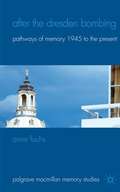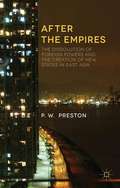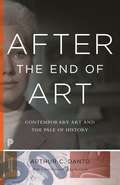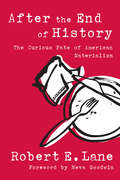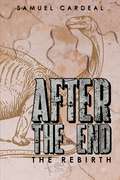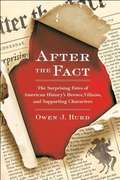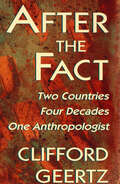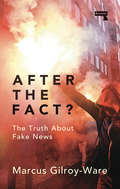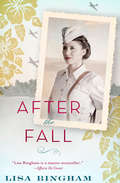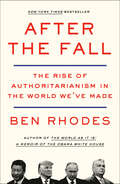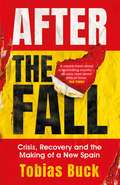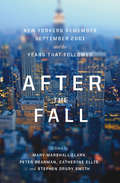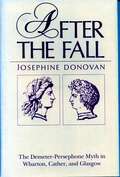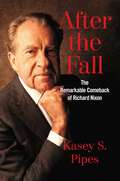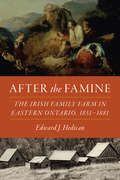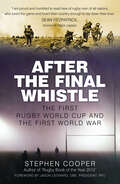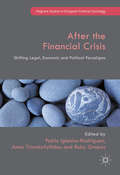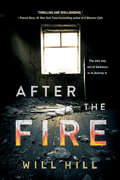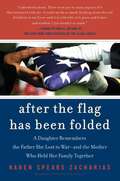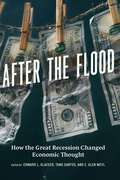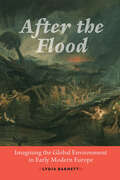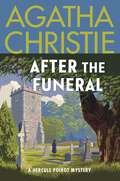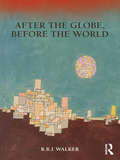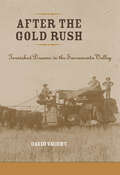- Table View
- List View
After the Dresden Bombing
by Anne FuchsTogether with Hiroshima and Nagasaki, Dresden belongs to a handful of global icons that capture the destructiveness of warfare in the twentieth century. Immediately recognisable, these icons are endowed with a powerful symbolism that cannot be explained with reference to historical cause and effect alone. This is precisely the terrain of this book, whichaddresses the long aftermath of the bombing in the collective and cultural imagination from 1945 to the present. The material under discussion ranges from archival documents, architectural journals, the built environment, travelogues, newspaper articles, documentaries, TV dramas, fiction, diaries, poetry to photography and fine art. As a case study of an event that gained local, national and global iconicity in the postwar period, it illuminates the media-specific transmission of cultural memory in dialogue with the changing socio-political landscape. Debating fundamental processes of cultural transmission, it exemplifies a new mode of doing cultural history that interweaves the local and the global. "
After the Empires
by P. W. PrestonThe shift to the modern world in East Asia was accomplished in part via the experience of colonial rule in the late nineteenth century. Following imperial crisis in the 1930s and 1940s, independent nation states formed from which the political structure of East Asia is based today.
After the End of Art: Contemporary Art and the Pale of History - Updated Edition (Princeton Classics #112)
by Arthur C. DantoOver a decade ago, Arthur Danto announced that art ended in the sixties. Ever since this declaration, he has been at the forefront of a radical critique of the nature of art in our time. After the End of Art presents Danto's first full-scale reformulation of his original insight, showing how, with the eclipse of abstract expressionism, art has deviated irrevocably from the narrative course that Vasari helped define for it in the Renaissance. Moreover, he leads the way to a new type of criticism that can help us understand art in a posthistorical age where, for example, an artist can produce a work in the style of Rembrandt to create a visual pun, and where traditional theories cannot explain the difference between Andy Warhol's Brillo Box and the product found in the grocery store. Here we are engaged in a series of insightful and entertaining conversations on the most relevant aesthetic and philosophical issues of art, conducted by an especially acute observer of the art scene today. Originally delivered as the prestigious Mellon Lectures on the Fine Arts, these writings cover art history, pop art, "people's art," the future role of museums, and the critical contributions of Clement Greenberg--who helped make sense of modernism for viewers over two generations ago through an aesthetics-based criticism. Tracing art history from a mimetic tradition (the idea that art was a progressively more adequate representation of reality) through the modern era of manifestos (when art was defined by the artist's philosophy), Danto shows that it wasn't until the invention of Pop art that the historical understanding of the means and ends of art was nullified. Even modernist art, which tried to break with the past by questioning the ways of producing art, hinged on a narrative. Traditional notions of aesthetics can no longer apply to contemporary art, argues Danto. Instead he focuses on a philosophy of art criticism that can deal with perhaps the most perplexing feature of contemporary art: that everything is possible.
After the End of History
by Robert E. LaneLane (emeritus, political science, Yale U. ), in this book-length dialogue between a fictional market economist and an equally- fictional humanistic social scientist, tackles the issue of whether human happiness can be achieved by over-promoting the market values of rationality and efficiency. His characters debate the proper way to organize to organize human society so as to achieve the greatest human well-being. Annotation ©2006 Book News, Inc. , Portland, OR (booknews. com)
After the End: The Rebirth
by Samuel CardealAfter the end of the world, the planet was born again, starting from small microorganisms until the creation of complex creatures, like men and dinosaurs. In their new organic structure, human beings have become dependent on the flesh for food, and they search for it in beasts, as they call what we now call dinosaurs. Rangel Connor is a military man on his first hunt in the wilderness territory. However, the onslaught in search of precious meat is thwarted by a violent attack of the animals. Rangel stays behind, but against all expectations, is not devoured by the monsters, but taken care by one of them. Alongside the dinosaurs, Rangel will discover the true value of a friendship and how vicious and vile the human mind can be in its delusions of grandeur. A story about men, dinosaurs and the true nature of homo sapiens.
After the Fact: The Surprising Fates of American History's Heroes, Villains, and Supporting Characters
by Owen J. HurdThis book picks up where traditional histories leave offNa OWhere Are They Now?O meets History 101. Lingering on the scene long after the smoke has cleared and the spotlights have moved on, it uncovers the telling details of history's most compelling subplots.
After the Fact: Two Countries, Four Decades, One Anthropologist (The Jerusalem-Harvard Lectures #5)
by Clifford Geertz“An unabashedly honest ethnography . . . [from] a founder of ‘symbolic’ anthropology . . . reflections on his fieldwork over a period of . . . forty years. Brilliant.” (Kirkus Reviews) In looking back on four decades of anthropology in the field, Geertz has created a work that is a personal history as well as a retrospective reflection on developments in the human sciences amid political, social, and cultural changes in the world. An elegant summation of one of the most remarkable careers in anthropology, it is at the same time an eloquent statement of the purposes and possibilities of anthropology's interpretive powers.Through the prism of his fieldwork over forty years in two towns, Pare in Indonesia and Sefrou in Morocco, Geertz adopts various perspectives on anthropological research and analysis during the post-colonial period, the Cold War, and the emergence of the new states of Asia and Africa. Throughout, he clarifies his own position on a broad series of issues at once empirical, methodological, theoretical, and personal. The result is a truly original book, one that displays a particular way of practicing the human sciences and thus a particular—and particularly efficacious—view of what these sciences are, have been, and should become.“Geertz charts the transformation of cultural anthropology from a study of "primitive" people to a multidisciplinary investigation of a particular culture's symbolic systems, its interactions with the larger forces of history and modernization.” —Publishers Weekly“An elegant, almost meditative volume of reflections.” —The New Yorker“[An] engrossing story of a few key moments in American social science during the second half of the twentieth century as [Geetz] participated in them.” —New York Times Book Review
After the Fact?: The Truth about Fake News
by Marcus Gilroy-WareWhy do we no longer trust facts, experts and statistics? In this essential guide to the turbulent times in which we live, Marcus Gilroy-Ware investigates our era of post-truths and fake news and answers the question of where we can go from here.We are supposed to have more information at our disposal now than at any time in history. So why, in a world of rising sea levels, populist leaders, resurgent fascism and a global pandemic, do so many people believe bizarre and untrue things about the world we live in? In After the Fact?, Marcus Gilroy-Ware shows us what really created the conditions for mis- and disinformation, from fake news and conspiracy theories, to bullshit journalism and the resurgence of the far-right, and why liberal newspaper columnists and centrist politicians are unable to turn back this tide. Spanning politics, culture, psychology, journalism, and much more, After the Fact? is a timely wake-up call for those who believe we can simply go "back to normal", and instead argues that, if we are to put an end to "fake news" we must deal with the broader social crises that are responsible for it.
After the Fall
by Lisa BinghamThe author of Into the Storm presents an epic tale of courage, danger, and love, set in the Pacific at the dawn of World War II. In late 1941, the Philippines is a haven for those intent on shedding their pasts and reinventing themselves. Lt. Riley Gilhouley—the Great Gilhouley—keeps the troops well stocked in contraband as he seeks the attention of Maj. Rosemary Dodd, a by-the-book officer who leads her nurses with expert care. Ex-priest John Macklin searches for absolution, but finds himself tangling with Glory Bee O&’Halloran, a stripper hired to take off just enough clothing to throw the troops into a frenzy. But when, mere hours after the bombing of Pearl Harbor, the Japanese attack the Philippines, the island haven explodes into the chaos of battle—and amid stolen moments and secret missions, all their lives will be forever changed. . . . Set in a besieged country waiting in vain for help to arrive, this stunning novel from a &“master storyteller&” offers a blend of riveting history and heartfelt emotion (Affaire de Coeur).
After the Fall: Being American in the World We've Made
by Ben RhodesWhy is democracy so threatened in America and around the world? And what can we do about it? A former White House aide and close confidant to President Barack Obama—and the New York Times bestselling author of The World as It Is—travels the globe in a deeply personal, beautifully observed quest for answers. <P><P>In 2017, as Ben Rhodes was helping Barack Obama begin his next chapter, the legacy they had worked to build for eight years was being taken apart. To understand what was happening in America, Rhodes decided to look outward. Over the next three years, he traveled to dozens of countries, meeting with politicians, activists, and dissidents confronting the same nationalism and authoritarianism that was tearing America apart. Along the way, a Russian opposition leader he spoke with was poisoned, the Hong Kong protesters he came to know saw their movement snuffed out, and America itself reached the precipice of losing democracy before giving itself a second chance. <P><P>Part memoir and part reportage, After the Fall is a hugely ambitious and essential work of discovery. In his travels, Rhodes comes to realize how much America’s fingerprints are on a world we helped to shape, through our post–Cold War embrace of unbridled capitalism and our post-9/11 nationalism and militarism; our mania for technology and social media; and the racism that fueled the backlash to America’s first Black president. At the same time, Rhodes learns from the stories of a diverse set of characters—from Barack Obama himself to Cuban rebels to a rising generation of international leaders—that looking squarely at where America has gone wrong makes clear how essential it is to fight for what America is supposed to be, for our own country and the entire world. <P><P><b>A New York Times Bestseller</b>
After the Fall: Crisis, Recovery and the Making of a New Spain
by Tobias BuckTobias Buck arrived in Madrid in December 2012, in time to celebrate the bleakest Christmas the city had seen in a generation. Capital and country were reeling from a series of economic shocks that had brought Spain to the brink of ruin. The housing boom had dramatically turned to bust, a large chunk of the nation's banking system was in state hands, businesses were closing across the country, debt was spiralling out of control and unemployment levels had reached a record high.AFTER THE FALL presents a rich and vivid portrait of contemporary Spain at a critical moment in the country's history. The book tells the story of Spain's long boom and sudden bust, the brutal economic crisis that followed, and the political and social aftershocks that reverberate to this day. It explores the origins of the separatist movement in Catalonia, and its bitter clash with the Spanish government that culminated in a failed secession referendum and a divisive declaration of independence. It looks at the legacy of the Civil War and Franco dictatorship, and the continuing struggle over historical memory in Spain today. Based on five years of reporting and hundreds of interviews, AFTER THE FALL takes the reader from the offices of power in Madrid and Barcelona to the villages of the Basque country, still haunted by the memory of political violence, and to the towns of Andalusia, where an entire generation has seen its economic hopes shattered. It describes how the country has been changed by the experience of migration, and why - after decades at the margins - the far-right eventually made a return to Spanish politics. For all the problems and challenges facing Spain today, we see that amid the ruins of the crisis, the search for a new Spanish model is already underway.
After the Fall: Crisis, Recovery and the Making of a New Spain
by Tobias BuckTobias Buck arrived in Madrid in December 2012, in time to celebrate the bleakest Christmas the city had seen in a generation. Capital and country were reeling from a series of economic shocks that had brought Spain to the brink of ruin. The housing boom had dramatically turned to bust, a large chunk of the nation's banking system was in state hands, businesses were closing across the country, debt was spiralling out of control and unemployment levels had reached a record high.AFTER THE FALL presents a rich and vivid portrait of contemporary Spain at a critical moment in the country's history. The book tells the story of Spain's long boom and sudden bust, the brutal economic crisis that followed, and the political and social aftershocks that reverberate to this day. It explores the origins of the separatist movement in Catalonia, and its bitter clash with the Spanish government that culminated in a failed secession referendum and a divisive declaration of independence. It looks at the legacy of the Civil War and Franco dictatorship, and the continuing struggle over historical memory in Spain today. Based on five years of reporting and hundreds of interviews, AFTER THE FALL takes the reader from the offices of power in Madrid and Barcelona to the villages of the Basque country, still haunted by the memory of political violence, and to the towns of Andalusia, where an entire generation has seen its economic hopes shattered. It describes how the country has been changed by the experience of migration, and why - after decades at the margins - the far-right eventually made a return to Spanish politics. For all the problems and challenges facing Spain today, we see that amid the ruins of the crisis, the search for a new Spanish model is already underway.
After the Fall: New Yorkers Remember September 2001 and the Years That Followed
by Mary Clark, Peter Bearman, Catherine Ellis, Stephen SmithNew Yorkers remember 9/11 in this landmark volume of oral history commemorating the tenth anniversary of the attacks—A &“staggering book of living memory&” (Booklist, starred review). Within days of September 11, 2001, Columbia&’s Oral History Research Office deployed interviewers across the city to collect the accounts and observations of hundreds of people from a diverse mix of New York neighborhoods and backgrounds. With follow-up interviews spanning years, the project produced a deep and revealing look at how the attacks changed individual lives and communities in New York City. After the Fall presents a selection of these fascinating testimonies, with heartbreaking and enlightening stories from a broad range of New Yorkers. The interviews include first-responders, taxi drivers, school teachers, artists, religious leaders, immigrants, and others who were interviewed numerous times since the 2001 attacks. The result is a remarkable time-lapse account of the city as it changed in the wake of 9/11, one that will resonate powerfully with New Yorkers and millions of others who continue to feel the impact of the most damaging foreign attack to ever occur inside the United States.
After the Fall: The Demeter-Persephone Myth in Wharton, Cather, and Glasgow (G - Reference, Information and Interdisciplinary Subjects)
by Josephine DonovanA continuation of Josephine Donovan's exploration of American women's literary traditions, begun with New England Local Color Literature: A Women's Tradition, which treats the nineteenth-century realists, this work analyzes the writing of major women writers of the early twentieth century—Edith Wharton, Willa Cather, and Ellen Glasgow.The author sees the Demeter-Persephone myth as central to these writers' thematics, but interprets the myth in terms of the historical transitions taking place in turn-of-the-century America. Donovan focuses on the changing relationship between mothers and daughters—in particular upon the "new women's" rebellion against the traditional women's culture of their nineteenth-century mothers (both literary and literal). An introductory chapter traces the male-supremacist ideologies that formed the intellectual climate in which these women wrote.Reorienting Wharton, Cather, and Glasgow within women's literary traditions produces major reinterpretations of their works, including such masterpieces as Ethan Frome, Summer, My Antonia, Barren Ground, and others.
After the Fall: The Remarkable Comeback of Richard Nixon
by Kasey S. PipesA Main Selection of the History Book Club! The Astonishing Comeback of Richard Nixon On August 9, 1974, Richard Nixon became the first and only U.S. president to resign from office—to avoid almost certain impeachment. Utterly disgraced, he was forced to flee the White House with a small cadre of advisors and family. Richard Nixon was a completely defeated man. Yet only a decade later, Nixon was a trusted advisor to presidents, dispensing wisdom on campaign strategy and foreign policy, shaping the course of U.S.-Soviet summit meetings, and representing the U.S. at state funerals—the very model of an elder statesman. How did he do it? Nixon leveraged his still sharp mind, his peerless political instincts, his deep connections with foreign leaders—but, above all, his stubborn refusal to accept defeat—to achieve a political restoration as astonishing as the fall that preceded it. Kasey S. Pipes, advisor to President George W. Bush, tells the fascinating story of Nixon’s comeback. Using unprecedented access to the private post-presidential documents at the Nixon Library, Pipes reveals inside information that has never been reported about Nixon’s successful campaign to repair his reputation and resuscitate his career, including: The true story behind the supposed medical “hoax” to get Nixon out of testifying at the Watergate trials of his aides in Washington The strategy behind Nixon’s apparently accidental on-air “confession” of the Watergate coverup to interviewer David Frost How Nixon’s advice on the Strategic Defense Initiative (SDI) shaped Ronald Reagan’s negotiations with Gorbachev—and changed history How Nixon traveled to China after Tiananmen Square to help preserve the U.S.-Chinese relations that he had opened up years earlier The Saturday morning presidential radio address: a Nixon idea Nixon’s surprising friendship with Bill Clinton After the Fall is the gripping and never-before-told story of one of the most remarkable reversals of fortune in American political history.
After the Famine: The Irish Family Farm in Eastern Ontario, 1851–1881
by Edward J. HedicanThe Irish Famine saw hapless Irish citizens starve to death and die of disease, while the population of a neighbouring country, England, lived in relative bounty and apparent disinterest. After the Famine investigates the subsequent emigration of many surviving Irish to Eastern Ontario and tells the story of how, despite hardships, the Irish in Canada managed to survive and prosper after fleeing tragedy. The author explains how the Irish adapted to their new land, and how we might account for their triumph as farmers under somewhat less than favourable environmental conditions. Examining their successful farming life in rural Ontario through their agricultural performance, changing family structures, and farming adaptations, this book is a must-read for anyone interested in the fate of the Irish after their greatest calamity.
After the Final Whistle: The First Rugby World Cup and the First World War
by Jason Leonard Stephen CooperAs Britain’s Empire went to war in August 1914, rugby players were the first to volunteer. They led from the front and paid a disproportionate price. In 1919, a grateful Mother Country hosted a rugby tournament: sevens teams at eight venues, playing 17 matches to declare a first ‘world champion’. There had never been an international team tournament like it. For the first time teams from Australia, Canada, New Zealand, South Africa, Britain and France were assembled in one place. Rugby held the first ever ‘World Cup’. It was a moment of triumph, a celebration of military victory, of Commonwealth and Allied unity, and of rugby values, moral and physical. In 2019 the modern Rugby World Cup moves to Japan in the Centenary of the King’s Cup. With a foreword by Jason Leonard, this is the story of rugby’s journey through the First World War to its first World Cup, and how those values endure today. 'After The Final Whistle' was shortlisted for the 2016 Cross Sports Book of the Year award.
After the Financial Crisis: Shifting Legal, Economic and Political Paradigms (Palgrave Studies in European Political Sociology)
by Pablo Iglesias-Rodríguez Anna Triandafyllidou Ruby GropasThis international collection studies how the financial crisis of 2007 and the ensuing economicand political crises in Europe and North America have triggered a process ofchange in the field of economics, law andpolitics. Contributors to this book argue that both elites and citizens havehad to rethink the nature of the market, the role of the state as a marketregulator and as a provider of welfare, the role of political parties inrepresenting society's main political and social cleavages, the role of civilsociety in voicing the concerns of citizens, and the role of the citizen as theultimate source of power in a democracy but also as a fundamentally powerlesssubject in a global economy. The book studies the actors, the areas and the processesthat have carried forward the change and proposes the notion of 'incompleteparadigm shift' to analyse this change. Its authors explore the multipledimensions of paradigm shifts and their differentiated evolution, arguing thattoday we witness an incomplete paradigm shift of financial regulations,economic models and welfare systems, but a stillbirth of a new political andeconomic paradigm.
After the Fire (Chicka Chicka Book)
by Will HillAn Edgar Award finalistA gripping and unforgettable story of survival after life in a cult, inspired by the survivors of the Branch Davidian siege in Waco, Texas, 1993The things I've seen are burned into me, like scars that refuse to fade.Before, she lived inside a fence with her family. After, she's trapped, now in a federal facility.Before, she was never allowed to leave the property, never allowed to talk to Outsiders, never allowed to speak her mind. After, there are too many people asking questions, wanting to know what happened to her, trying to find out who she really is.Before, she thought she was being protected from something. After, people are telling her that now she's finally safe.She isn't sure what's better, before or after, all she knows is that there are questions she can't answer, and if everything she's been told is a lie, how can she know who's telling the truth now?Suspenseful and moving, After the Fire is perfect for readers looking forcult books and storiesyoung adult historical fictionbinge-worthy teen thrillersan intense, ripped-from-the-headlines plotcompulsively readable books that keep you hooked until the very endPraise for After the Fire:"Genuinely different…thrilling and spellbinding!"—Patrick Ness, #1 New York Times bestselling author"The gripping story of survival and escape…It will keep you up late until you get to the very end."—Maureen Johnson, New York Times bestselling author of Truly Devious"A heartrending portrait of a young girl's struggle to survive a domineering religious sect and the resilience of the human spirit; this belongs on every YA shelf." —School Library Journal
After the Flag Has Been Folded: A Daughter Remembers the Father She Lost to War--and the Mother Who Held Her Family Together
by Karen Spears ZachariasKaren Spears was nine years old, living with her family in a trailer in rural Tennessee, when her father, David Spears, was killed in the Ia Drang Valley in Vietnam. It was 1966 -- in a nation being torn apart by a war nobody wanted, in an emotionally charged Southern landscape stained with racism and bigotry -- and suddenly the care and well-being of three small children were solely in the hands of a frightened young widow with no skills and a ninth-grade education. But thanks to a mother's remarkable courage, strength, and stubborn tenacity, a family in the midst of chaos and in severe crisis miraculously pulled together to achieve its own version of the American Dream.Beginning on the day Karen learns of her father's death and ending thirty years later with her pilgrimage to the battlefield where he died, half a world away from the family's hometown, After the Flag Has Been Folded is a triumphant tale of reconciliation between a daughter and her father, a daughter and her nation -- and a poignant remembrance of a mother's love and heroism.
After the Flood: How the Great Recession Changed Economic Thought
by Edward L. Glaeser E. Glen Weyl Tano SantosThe past three decades have been characterized by vast change and crises in global financial markets—and not in politically unstable countries but in the heart of the developed world, from the Great Recession in the United States to the banking crises in Japan and the Eurozone. As we try to make sense of what caused these crises and how we might reduce risk factors and prevent recurrence, the fields of finance and economics have also seen vast change, as scholars and researchers have advanced their thinking to better respond to the recent crises. A momentous collection of the best recent scholarship, After the Flood illustrates both the scope of the crises’ impact on our understanding of global financial markets and the innovative processes whereby scholars have adapted their research to gain a greater understanding of them. Among the contributors are José Scheinkman and Lars Peter Hansen, who bring up to date decades of collaborative research on the mechanisms that tie financial markets to the broader economy; Patrick Bolton, who argues that limiting bankers’ pay may be more effective than limiting the activities they can undertake; Edward Glaeser and Bruce Sacerdote, who study the social dynamics of markets; and E. Glen Weyl, who argues that economists are influenced by the incentives their consulting opportunities create.
After the Flood: Imagining the Global Environment in Early Modern Europe
by Lydia BarnettHow the story of Noah's Flood was central to the development of a global environmental consciousness in early modern Europe.Winner of the Morris D. Forkosch Prize by the Journal of the History of Ideas, Short-listed for the Kenshur Prize by the Center for Eighteenth-Century Studies, Indiana UniversityMany centuries before the emergence of the scientific consensus on climate change, people began to imagine the existence of a global environment: a natural system capable of changing humans and of being changed by them. In After the Flood, Lydia Barnett traces the history of this idea back to the early modern period, when the Scientific Revolution, the Reformations, the Little Ice Age, and the overseas expansion of European empire, religion, and commerce gave rise to new ideas about nature and humanity, and their intersecting histories. Recovering a forgotten episode in the history of environmental thought, Barnett brings to light the crucial role of religious faith and conflict in fostering new ways of thinking about the capacity of humans and nature to change each other on a planetary scale. In the hands of Protestant and Catholic writers from across Europe and its American colonies, the biblical story of Noah's Flood became a vehicle for imagining the power of sin to wreck the world, the dangers of overpopulation, the transformative effects of shifting landforms on the course of human history, and the impact of a changing climate on human bodies, health, and lives. Following Noah's Flood as a popular topic of debate through long-distance networks of knowledge from the late sixteenth through the early eighteenth centuries, Barnett reveals how early modern earth and environmental sciences were shaped by gender, evangelism, empire, race, and nation. After the Flood illuminates the hidden role and complicated legacy of religion in the emergence of a global environmental consciousness.
After the Funeral: A Hercule Poirot Mystery: The Official Authorized Edition (Hercule Poirot Mysteries #29)
by Agatha ChristieHercule Poirot is called on to investigate the murder of a brother and sister, in this classic Agatha Christie mystery now available in an updated edition with a foreword Sophie Hannah. “He was murdered, wasn’t he?”When Cora Lansquenet is savagely murdered, the extraordinary remark she had made the previous day at her brother Richard’s funeral suddenly takes on a chilling significance. At the reading of Richard’s will, Cora was clearly heard to say, “It’s been hushed up very nicely, hasn’t it. But he was murdered, wasn’t he?”Did Cora’s accusation a dark truth that sealed her own fate? Or are the siblings’ deaths just tragic coincidences?Desperate to know the truth, the Lansquenet’s solicitor turns to Hercule Poirot to unravel the mystery. For even after the funeral, death isn’t finished yet . . .
After the Globe, Before the World
by RBJ WalkerThis book explores the implications of claims that the most challenging political problems of our time express an urgent need to reimagine where and therefore what we take politics to be. It does so by examining the relationship between modern forms of politics (centred simultaneously within individual subjects, sovereign states and an international system of states) and the (natural, God-given or premodern) world that has been excluded in order to construct modern forms of political subjectivity and sovereign authority. It argues that the ever-present possibility of a world outside the international both sustains the structuring of relations between inclusion and exclusion within the modern internationalized political order and generates desires for escape from this order to a politics encompassing a singular humanity, cosmopolis, globe or planet that are doomed to disappointment. On this basis, the book develops a critique of prevailing traditions of both political theory and theories of international relations. It especially examines what it might now mean to think about sovereignties, subjectivities, boundaries, borders and limits without automatically reproducing forms of inclusion and exclusion, or universality and particularity, expressed in the converging but ultimately contradictory relationship between international relations and world politics.
After the Gold Rush: Tarnished Dreams in the Sacramento Valley
by David Vaught2008 Winner of the Albert J. Beveridge Award of the American Historical Association"It is a glorious country," exclaimed Stephen J. Field, the future U.S. Supreme Court justice, upon arriving in California in 1849. Field's pronouncement was more than just an expression of exuberance. For an electrifying moment, he and another 100,000 hopeful gold miners found themselves face-to-face with something commensurate to their capacity to dream. Most failed to hit pay dirt in gold. Thereafter, one illustrative group of them struggled to make a living in wheat, livestock, and fruit along Putah Creek in the lower Sacramento Valley. Like Field, they never forgot that first "glorious" moment in California when anything seemed possible. In After the Gold Rush, David Vaught examines the hard-luck miners-turned-farmers—the Pierces, Greenes, Montgomerys, Careys, and others—who refused to admit a second failure, faced flood and drought, endured monumental disputes and confusion over land policy, and struggled to come to grips with the vagaries of local, national, and world markets.Their dramatic story exposes the underside of the American dream and the haunting consequences of trying to strike it rich.
